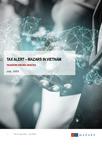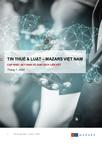
Tax Alert - Decree 68 on the deductibility of interest expenses
Decree 68 on the deductibility of interest expense
The key amendments and guidance in Decree 68 and OL 2835 are summarized as below:
1. Relaxation of deductible interest cap
Decree 68 raises interest limitation rule to maximum 30% EBITDA from 20% EBITDA as previously imposed by Decree 20. The interest expense subject to such cap is calculated on a net basis, offsetting interest expense with bank deposits and loan interest incomes in the same tax year. EBITDA is short for Earnings Before Interest, Tax, Depreciation and Amortization, equal to operating profit/loss from business activities plus (+) net interest expense plus (+) depreciation/ amortization expenses.
The above change is allowed to be applied retrospectively for tax years 2017 and 2018.
2. Carry-forward of disallowed interest expense in excess of 30% EBITDA cap
From 2019 tax year - with corporate income tax (“CIT”) return deadline from 31 March 2020 onwards, any disallowed interest expense exceeding 30% EBITDA can be carried forward consecutively to the next five tax years, as long as the respective net interest expenses in those tax years are still below the stipulated cap. The time limit for such carry-forward shall be five consecutive years from the year following the year in which the disallowed interest expense arises.
OL 2835 clarifies further that no retrospective application of such carry-forward shall be allowed for CIT periods 2017 and 2018.
3. Exemptions to interest limitation rule
Decree 68 has added the cases to be exempted from the deductible interest cap, including:
- Loans under Official Development Assistance (ODA);
- Concessional loans by the Government to enterprises, funded by governmental foreign loans;
- Loans to implement specific national programs (including New Rural and Sustainable Poverty Reduction Program);
- Loans to fund programs and projects related with national welfare policies (Houses for resettlement, for workers, students and other public welfare projects)
4. Retrospective application for the tax years 2017 and 2018
If the amount of CIT payable in these years can be reduced under the application of the new cap, any corresponding late payment interest shall be reduced as well, specifically:
- In case no tax audit has been conducted for 2017-2018, taxpayers have the right to file their revised CIT returns before 1 January 2021, and the managing tax authority shall be responsible for examination of such dossiers at the tax authority's office. Overpaid CIT and entailed late payment interests attributed to the new interest cap, if any, would be offset against CIT payable for 2020 - 2024 tax years on a consecutive basis. After that five-year period, any remaining difference shall be considered as permanent non-deductible expense.
- In case tax audit was finalized for 2017-2018, taxpayers have the right to request the managing tax authority to re-determine the CIT payable and corresponding late payment interest. Similarly, based on tax authority’s re-calculation, any reduced obligations on CIT and late payment interest would be allowed to offset against CIT payable for 2020-2024 period. However, relevant tax penalties as deemed in the tax audit decision are not allowed to be revised or offset.
5. Amendment of Transfer Pricing Disclosure Form No. 01 (Form 01)
Transfer Pricing (“TP”) form previously issued along with Decree 20, which provides information on related party relationships and transactions, shall be replaced by the new Form No. 01 attached with Decree 68. The new form reflects the amendments regarding deductibility of interest expense, focused on section IV, summarized as follows:
- Line (8.1): Clarifying "interest income" as the total amount of deposit income and loan interest income
- Line (13) and Line (14): Revising the formula of EBITDA and net interest expense/EBITDA ratio in line with the new degree
- Line (15a, 15b, 15c, 15d, 15e) and Line (16): These lines have been added to Form 01 to record the carried-forward interest expense over years, as well as the ratio of "accumulated" interest expense (including carried-forward interest expenses if any) over EBITDA in the concerned period
In addition, Section III of the new TP form also add Column (13) - Information about Transactions within the scope of Advanced Pricing Agreement (“APA”). In this column, the taxpayer declares "x" for transactions within the scope of APA and "not applicable" for transactions out of the scope of APA.
OUR SUPPORT
We do trust the above points are notable and sufficient, but should you have any questions or need a deeper discussion on this issue, please do not hesitate to contact us.
Download full issue in English and Vietnamese below |






